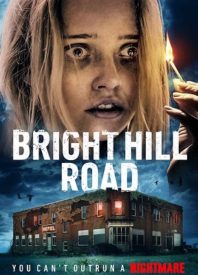
“What if Billy Wilder’s The Lost Weekend was actually a Conjuring film” is the question asked by Robert Cuffley’s shot-in-Calgary, psychological thriller Bright Hill Road. This is a question that I feel no one has ever asked before, and probably for good reasons. But ask the question Cuffley does, and the result is a very silly film that gets deep into the traumas of young alcoholics.
The effectiveness of Wilder’s original detox film ultimately lay within its ability to create nightmarish imagery out of a man’s hallucinations. The no nonsense approach favored by Wilder works wonders considering the temporal the context of the film; an important issues movie, yes, but one that manages to really generate some empathy out of more realistic shocks. Cuffley’s biggest departure is found in his determination to take the opposite approach, where the traumas of a young woman named Marcy (Heartland’s Siobhan Williams) literally manifest themselves as spooky shadow ghosts inside of a haunted rehab facility.
Marcy is an alcoholic. We can tell from the numerous wine bottles on her shelf, and the perpetually rack focusing fish-eye lenses that occur atop her attempts to get up for work in the morning. Additionally, the guzzled fifth while getting dressed acts as yet another clue. It’s very obvious just how much she is struggling.
It is in this inebriated state that Marcy heads to yet another day at the office. Instead of using this to explore where she is at as a character, the film decides to shift gears to an office shooting. Herein lies the conundrum that I have with Bright Hill Road. There is almost certainly space for a nuanced discussion about addiction and the guilt of it, but it is difficult to an extent that borders on impossible to do so if it is attached to a schlocky thriller. For the life of me, I cannot come up with a justification for this opening. At the just about every turn, the film undermines itself. The moment in which Williams, who puts in a more than adequate performance, will provide us with some acting based nuance are almost instantaneously followed up with jump scares, needless narrative twists, or general horror-based tropes.
Supposedly, Cuffley shot most of the film in and around Calgary. As an Albertan, I find this very cool, even if I’m an Edmontonian and we’re supposed to be rivals. Cuffley also seems to be quite competent at working with a smaller budget. There’s a lot here that’s milked out of internal frames and varied shot distances. But I’d rather Bright Hill Road be more befitting of that scope and scale, and focused on really getting into the mind of its lead character. Instead, it’s far too lurid and twisted to do so, and that’s the real disappointment here.

